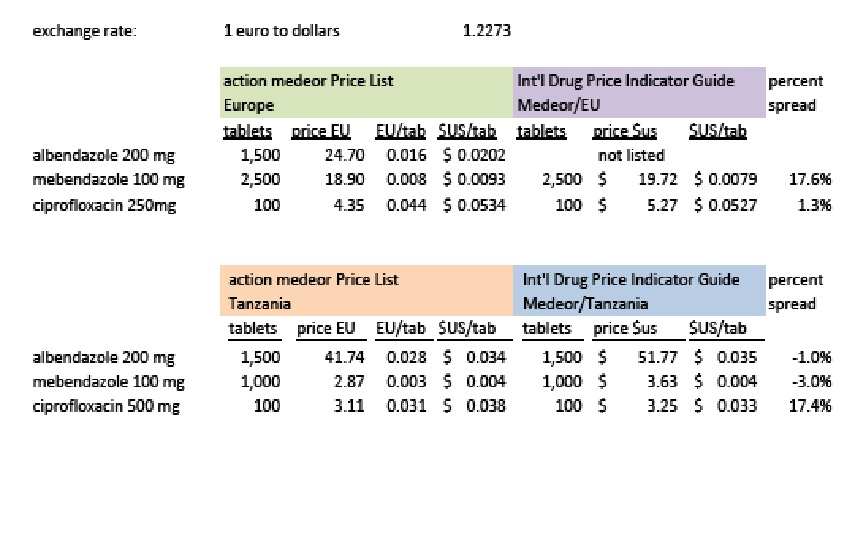This post will have some inside-baseball info for those who are following the issue of how to value donated medicines that has been underway in the NPO and audit communities.
I came across a publicly available price list from a vendor, action medeor, that provides prices for a large range of medicines.
Since there is a behind-the-scenes debate whether the International Drug Price Indicator Guide (IDPIG) has any valid or relevant data in it, I decided to compare the public price list to the amounts listed in the IDPIG.
What did I find?
Prices in the IDPIG are very close to the price list.
I looked at four medicines: 200 mg albendazole and 100 mg mebendazole along with 250 mg and 500 mg ciprofloxacin. These are meds visible in the current conversations on valuing donated medicine.
This vendor has meds available from a European location and from Tanzania. Neither location offers 500 mg mebendazole. For the Cipro, 250 mg tablets are available from the European location and 500 mg tablets are available from Tanzania.
Here is the source of my data:
- action medeor home page
- action medeor price lists (there are separate price lists for the European and Tanzanian offices.)
- International Drug Price Indicator Guide
The data listed is from 2012 for the price list and from 2010 for information from the IDPIG.
Action medeor is the vendor that shows up for many of the items listed in the IDPIG.
Below I have listed information from the action medeor and the IDPIG.

I’d like to point out two items for you to ponder: first, look at the low difference between the price list and the IDPIG; second the prices per pill are in the range of pennies per dose.
I think it is reasonable to infer the data in the International Drug Pricing Indicator Guide is representative of actual prices for which medicine can be purchased in large volumes on the international market. It sure looks to me like this is a valid data point for indications of the fair value of donated meds.
I’m open to ideas why those are not reasonable conclusions. I’m willing to provide space for a guest post if anyone would like to present alterative ideas.
The home page of Action Medeor provides some useful information:
“Today the charitable, non governmental organisation action medeor e.V. is the largest medical aid organisation in Europe. medeor depends on the support of its donors to provide a wide range of services throughout the world.”
1. They are an aid organization and not a commercial supplier.
2. They depend on donor support to provide the drugs at the prices they do (i.e. the prices are subsidized).
They go on to say:
“We are able to offer high quality at a low price by buying in bulk and selling at cost price.”
This again indicates that they prices are not equivalent to an exit market fair value according to GAAP.
It seems that Action Medeor is validating the opinion that commercial fair market values are in fact higher than the prices indicated on the IDPIG
Leif – thanks for your comment.
To what extent are the operations of action medeor supported by donations? Do they buy most of their meds or are most of them donated?
Can you point to any public prices lists from commercial vendors? If you are aware of any, please let me know. I’d like to compare them to the IDPIG.
This weekend I’ll look around to see if I can find some financial statements for action medeor.
Here is a longer quote from the home page:
“We support around 10.000 healthcare centres, particularly small facilities, in 140 countries. action medeor sends drugs and medical equipment to developing countries, either at cost price or as donations. Potential recipients of aid are asked to provide detailed information and authorisation by local officials or may receive an on-site visit. Our partners either commission the production of generic drugs or order them in bulk from European pharmaceutical manufacturers. These drugs are patent-free, high quality and low priced. We are able to offer high quality at a low price by buying in bulk and selling at cost price.”
Here is a comment from the Tanzania page:
“Most of our products are purchased locally in line with action medeor’s policy to support local manufacturers – however, without compromising on quality. Products not available locally are procured from European and international manufacturers. We negotiate with suppliers for the lowest possible price due to bulk sourcing, thus benefiting from quantity discounts.
“To operate as a non-for-profit organisation our mark-ups are at the lowest possible margin to cover the operating and maintenance costs of our organisation, therefore we are not in the position to grant discounts to any customers.”